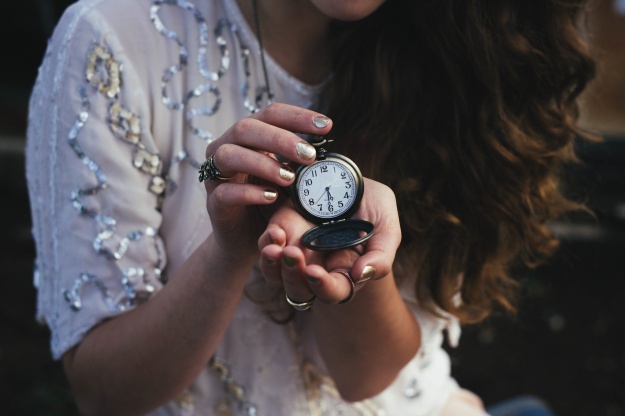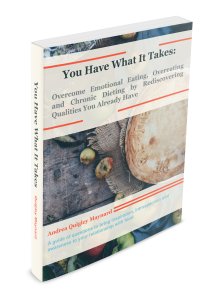
Choosing to love yourself is a worthy adventure!
Until you fall in love with yourself, you will battle the same weight issues you’ve always battled.
Until you accept your body and yourself as you are, you will never lose weight and keep it off. You might be successful for a little while in losing it, but you’ll gain it back, sometimes even more weight than you lost to begin with, if you refuse to accept and love yourself.
The same behaviors that made you gain weight will come back.
The same thoughts and judgements that led to eating more will come back.
The same “comfort” eating that actually brings discomfort.
The same hiding and denial that makes you want to shrink from living your life the way you want to.
The same feelings of disgust, shame, anger, frustration and anxiety will resurface again and again.
If you think, I’ll love myself when I’m skinny, when I’m fit, when I don’t have this tire around my middle, you will always be looking for that love somewhere else, and in your particular case you’ll look for that love in food.
You need to love yourself NOW – as you are right now.
When you do love yourself, wholly, completely, fully, and without judgement about what your body looks like, the eating stuff will fall into place. It won’t feel like such a big struggle.
I know it feels like a big struggle now. And you wonder how you can just let go of the hate for your body, the hate for your size or shape, the hate for yourself for what or how much food you put in your mouth. The hate you feel for yourself sometimes.
It’s not as complicated as we make it out to be.
You have to let go of this idea you have about yourself – that you are unloveable and broken.
It’s not any different than when we want to move on from unhappiness in our relationships.
Let’s imagine that you’ve had a huge argument with a friend or family member who you love. I’m sure you’ve experienced this before! For awhile, you are more mad or angry at the other person than you are sad that the relationship is strained. You want to feel “right” or feel your anger more than you want to admit any wrong doing or to give them forgiveness. You hold on to the anger, the pain, the stress of the fight for a while because it is serving you in some way. But there comes a point where it hurts more to still be angry. It takes more effort to maintain the distance between you and this person than it would to just forgive them or let go of the discord. We usually can’t forgive them immediately after a fight – emotions are too high and we need time and space before we have the clarity to allow us to take that step. But eventually, if we want to move on in our lives or move forward with this relationship we have to forgive, we have to LET GO. Not really for them – but for ourselves. If we don’t, it will continue to weigh us down. The anger and negativity will fill other parts of our lives. We usually come to a place where we see more value in letting go than holding on to the old grudge and when we do finally do decide to forgive, it’s actually without a lot of fan fare.
It’s actually really easy to do. It’s not easy when we’re not ready . . .but when you get to a place where the pain of not forgiving is greater than letting go and forgiving – it’s actually quite easy. The repairing of the relationship may take additional work and time (just like repairing our relationship with food) but giving forgiveness, letting go and choosing love is more straightforward.
Letting go of the hate you have for your body is just like the above example.
If it feels too hard, you may be going through a time when you aren’t ready to give that up. The feelings of hate you have for yourself appear to be bringing you more value right now but eventually you will get to a place where holding onto that hate and allowing it to color your life will feel more painful and take more effort than it does to just let it go.
Let it go.
There are two exercises I recommend you try to begin the process of letting go of the hate you feel for your body and beginning to view it with more love.
- Write a letter to yourself.
Write an apology letter to your body. Start by laying out what words or actions you are sorry to have used towards her (you), what you are grateful for and how you will start acting differently in the future. Exercises like this help us to “soften” towards ourselves – even if it feels a bit silly when we are writing it out!
Use some of these prompts to get started:
“I am sorry because . . .”.
“I have dishonored you by . . . ”
“I appreciate you for . . . .”
“I am grateful for you because . . .”
“You have taught me . . .”
“In the future, I will no longer . . . ”
“I look forward to . . . ”
“You (I) deserve . . . ”
2. Visualize putting the hate away in a box and shipping it away.
It’s easy to knock visualization exercises – they seem so abstract and “woo woo” that it’s hard to believe that they can be powerful tools of change! But if you have a good imagination (and if you’re a lover of books like I am or any creative arts then you do!) they can be an easy way to spark change and help you to be more conscious of your actions. To help stop some of the hateful thoughts you have about your body and increase feelings of love, try visualizing your hate or thoughts of hate as something physical. You might see a big grey cloud or something more concrete like animated physical words. Whatever it is that you picture when you have these thoughts, imaging that you have 2 boxes in front of you. One is sealed up and the other is empty and needs to be filled and sealed. First, take the empty box and fill it with whatever physical image you visualized your hateful thoughts as (grey blob? words? etc). Stuff them in there. All of them. Then, close the flaps and seal the box with some heavy duty packing tape. Visualize picking up the box and walking to a post office box and then drop the box in. Once it’s in the post office box you can’t reach it anymore – it’s literally out of your reach! Those thoughts are going to be shipped away and are no longer your concern. Now, go back home to the other sealed box waiting for you. Open it up. Inside there are “wearable” words, thoughts and feelings of love and acceptance. Pick each one up and put it on. “Dress” yourself in these loving words and feelings. What do they look like to you? How do you feel when you try them on?
Try these two exercises and see if they help you open up and feel more accepting, tolerant and loving towards yourself.
Eating is not a character flaw. It’s not a moral shortcoming. You do not deserve poor treatment because of your eating choices.
Practice choosing love, more often, until it becomes your only choice – that’s when food becomes less of an issue and your weight struggles will not be a struggle any more.
Have you gotten my newest free guide You Have What it Takes? If you’re an emotional eater, overeater or longtime dieter who wonders if she has what it takes to change her relationship with food, then this for you. And it’s free. Click on the image below, then enter your name and email and it’s yours!







 Last week I talked about the
Last week I talked about the 






